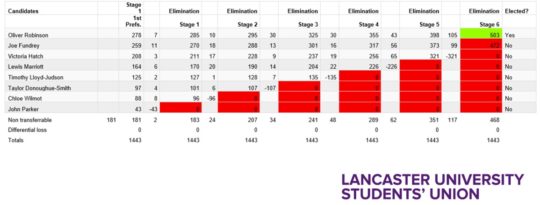
Was the Durham SU RON election fiasco just like Lancaster’s? We took a look
Is it dodgy? That’s for you to decide
Lancaster University Students’ Union is rarely without scandal. With six resignations of elected officers this year, the dismissal of a President, and the disqualification of votes to reopen nominations (RON) in the latest by-election; not to mention the attempted sale of The Sugarhouse, and the discontinuation of college sport C leagues, LUSU has been marred by controversy this past academic year.
The topic on everyone’s lips right now is the disqualification of the “Send a Message, Vote RON” campaign, and whether the Students’ Union is indeed keeping things from its students, as some have already alleged.
Earlier in the year, alternative student media outlet Spineless reported on the allegations of election rigging against Lancaster and Durham Universities’ Returning Officer, after it was revealed that Durham SU’s own election featured 58 per cent of votes in favour to RON, but they were disqualified.
With this in mind, The Tab Lancaster and Spineless joined forces to find out just how similar the elections in Lancaster and Durham were, and whether students are right to be suspicious.
Serious traction was gained by a campaign to RON at both universities

A meme from the “Send a Message, Vote RON” campaign in Lancaster
Usually RON is just a formality on the ballot, but in the 2020 elections for both Students’ Unions the RON candidate became something else entirely.
As Durham Students’ Union’s website will explain, the university had never had a RON vote win an election before this, and therefore RON winning would be unprecedented.
Durham’s student newspaper reported that: “A Facebook page supporting the Re-Open Nominations option – ‘Vote RON in the DSU Elections’ – was launched just hours before the voting window opened. The page [was] liked by several college JCR Presidents and Vice-Presidents.” The RON campaign in Durham gained so much traction, in fact, that it prompted their Students’ Union to post a statement on their website explaining the implications of voting RON.
This is very similar to the “Send a Message, Vote RON” campaign Facebook page that was established on the 4th June – less than two weeks before the SU by-election.
One difference between the two that should be noted: in Durham’s elections RON is considered a candidate, whereas in Lancaster’s RON is described as an “option” within LUSU’s bye-laws, therefore throwing any of their comments describing RON as a candidate are ambiguous at best.
Both SUs postponed the announcement of results, citing that an external investigation was being carried out

Durham University Students’ Union cancelled the announcement of their results the day before they were due to be revealed – Lancaster cancelled its reveal on the day that voting in the election closed.
Following the traction gained by Durham’s unprecedented RON campaign, their SU called for an independent external review into the election. LUSU called for an asked its Returning Officer to investigate Lancaster’s RON campaign following complaints made to the SU surrounding the breaches of electoral rules. So far, so similar.
Durham’s Vice-Chancellor also intervened in order to stop the release of further details surrounding the RON situation as a result of a student’s Freedom of Information request, claiming that University staff needed a “safe space” to provide advice to DSU.
The same Returning Officer was involved in the elections
Both Durham University Students’ Union and Lancaster University Students’ Union used Peter Robertson, acting NUS Charity Director, as their Returning Officer in these elections.
Robertson had already been accused within the NUS of trying to orchestrate “a complete shutdown of NUS rank and file democracy.”
Whether or not these allegations are true is yet to be seen, however the fact of the matter is that both universities used the same Returning Officer to ensure fair and democratic conduct in their elections.

But this begs the question: how come an NUS official is involved in LUSU elections?
Robertson was appointed at the Trustee Board meeting on 5 February 2020. Graeme Osborn said that “the Union has a long-standing arrangement with the NUS under which they provide the Returning Officer for our elections. This is a system used by a number of other students’ unions across the country.”
As an affiliate of NUS, LUSU uses UnionCloud (society/JCR exec members will be familiar with this). One of the functions of UnionCloud is to run elections, amongst other things. LUSU also uses NUS Elections Support Service, an “independent national body” which seeks to assure institutions that their regulatory requirements under the Education Act (1994) are met. When opting into the Election Support Service, institutions must name Robertson as their Returning Officer.
Robertson is also the Returning Officer for over 100 universities, including: Chester, De Montford, Derby, Greenwich, Huddersfield, Keele, Leeds Trinity, London Metropolitan, Manchester, Portsmouth, Royal Holloway, Salford, Sunderland, York.
Robertson told The Tab Lancaster that around 1000 SU elections across the country are signed off with his name every year, but confirmed that he was the one to make the decision to disqualify votes to RON at Lancaster and Durham.
Both universities released vague FAQs following the election
LUSU and DSU both released statements following student outrage at the decision to disqualify RON. Both of these were in the form of a frequently asked questions (FAQs) page.
Many students are calling out LUSU for spreading “misinformation” and are pushing a set narrative due to the framing of the information that they released.
When asked if Lancaster University Students’ Union were being deliberately obtuse, the Returning Officer agreed, saying “they probably are.”
Lancaster University Students’ Union’s FAQs page can be found here.
Durham Students’ Union’s FAQs page can be found here.
Both universities didn’t say how many votes RON had at first

Though LUSU did release the count sheet from the by-election, the complete number of votes to RON (including transferable votes) were not included in this. Following the Students’ Union’s release of the FAQs page, it was assumed by the SU that RON had received 181 non-transferable votes. This figure does not indicate the number of transferable votes cast to RON that were transferred to another candidate following RON’s disqualification.
LUSU has not released those figures, despite calls from JCRs, resigning officers, and President-elect, Oliver Robinson. Regarding the 181 non-transferable votes, the Returning Officer said: “I don’t know where they got that figure from.”
Durham Students’ Union neglected to publish any voting figures whatsoever on their FAQs page, regardless of student outrage at the decision to disqualify RON. It was two weeks after the election that Durham announced their election figures, where it transpired that the votes to reopen nominations were at 58 per cent.
Speaking to the Returning Officer, he said: “We simply do not know what’s happened to [Lancaster’s] figures, as RON was disqualified before the count. I’m not sure if it’s possible to be definitive. It’s a natural assumption that the votes that didn’t transfer were for RON, but as the disqualification had already taken place we don’t actually know why those votes didn’t transfer.”
So it appears as though Lancaster University Students’ Union has no way to reveal the actual number of votes cast for RON, because all of those votes were disqualified before being counted.
What was different?
The reasons for disqualification.
The Returning Officer told The Tab Lancaster that in Durham’s election RON was disqualified due to a “technical breach.” He went on to explain that at Durham many JCR Presidents had used their official Facebook pages to support the RON Campaign – Durham JCR Presidents are technically employees of the university, and as such can’t be involved in election campaigning. Therefore this was a breach of election rules at Durham.
However in Lancaster’s by-election, RON was disqualified due to the unofficial campaign’s Facebook page posting content that had been complained about to the SU. The Returning Officer suggested that one of the posts was “in the current climate, at best ill-informed, and at worst was overtly racist.” He then said that if any candidate had posted the same content then they too would’ve been disqualified.
Why could Durham show how many votes RON had, but LUSU can’t?
Durham did not use the same election system that Lancaster uses in its Students’ Union elections. Although both are a transferable voting system, they are not the same. Durham’s election system was unable to transfer votes cast for RON once the RON votes were disqualified; whereas in Lancaster’s case, all of RON’s votes were transferred where a second preference was named on the voting slip.
Because of this technical glitch, Durham SU was able to announce that RON had received 58 per cent of the vote in that election.
When contacted for comment, Durham Students’ Union said: “Durham SU’s use of NUS to provide a deputy returning officer is, we understand, common practice across many students’ unions. Durham SU makes all of our decisions within the context of our rules and relies on the judgement and experience of our own elections officials. It’s a big step to withdraw any candidate, so we investigate in depth and make that decision carefully.
“The campaign to elect RON broke a serious elections rule, and withdrawal of that candidate was the only appropriate response. This adds time to the declaration of results. Students want to know that confidence can be placed in the election, so we don’t release results until all outstanding matters have been resolved. We understand that this was frustrating, but we’re sure that students want us to get it right and they understand that this takes time.”
Despite the student body’s outrage, LUSU seems to have washed its hand of the by-election, and it looks as though it can’t release any further voting figures. Both elections have lots of similarities, yes, but based on the information available it would be difficult to conclude that the two events were overtly linked.
Lancaster University Students’ Union has been contacted for comment.
Related articles recommended by these writers:
County College threatens disaffiliation over by-election
Sugar, sports, and sending a message – an interview with the new LUSU President
All the reasons RON was disqualified – straight from Lancaster’s Returning Officer









































